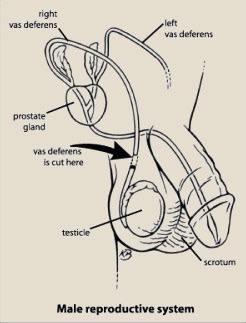During ejaculation, sperm produced by the testes travels along two small tubes (the vas deferens) and joins fluid from structures called the seminal vesicles and the prostate gland. This combined fluid leaves the vas deferens and enters the urethra which is the tube in the penis through which urine also leaves the body.
Vasectomy (or ‘the snip’ as it is often referred to) is the medical name for male sterilization. It involves cutting and sealing the two small sperm-carrying tubes (vas deferens). Hence, during intercourse, sperm can no longer escape with the remainder of the ejaculate to fertilise the female egg. Sperm only contribute a small percentage to the total ejaculate volume, hence the ejaculate changes little after a vasectomy and certainly sexual function is not diminished. Sperm are still produced but are absorbed by the body without causing any swelling. This process occurs normally even before vasectomy if a man doesn’t ejaculate for a time; so function is not really interfered with.
The operation itself involves the use of local anaesthetic in a small area of the loose skin of the upper scrotum in the mid-line at the front just under the base of the penis. A single skin incision about 4-5mm is all that is needed in the vast majority. Both left and right vas can be accessed through this tiny incision using the special Li instruments. Then less than a centimetre of each tube is removed, the cut ends of each are sealed using cautery and then tied with a small dissolvable surgical stitch – unless open-ended vasectomy has been requested (see FAQ). They are then retracted back into the scrotum to resume their usual positions. No stitch in the skin is usually required as the tiny break for access is so small the skin edges close against each other immediately.
The procedure only takes about 12 minutes during which normal conversation can occur.
After the procedure the patient should rest for the remainder of the day or do activities in a sitting or lying position. Strenuous activity should be avoided for about 5-7 days. Intercourse is best avoided for about 5 days.

